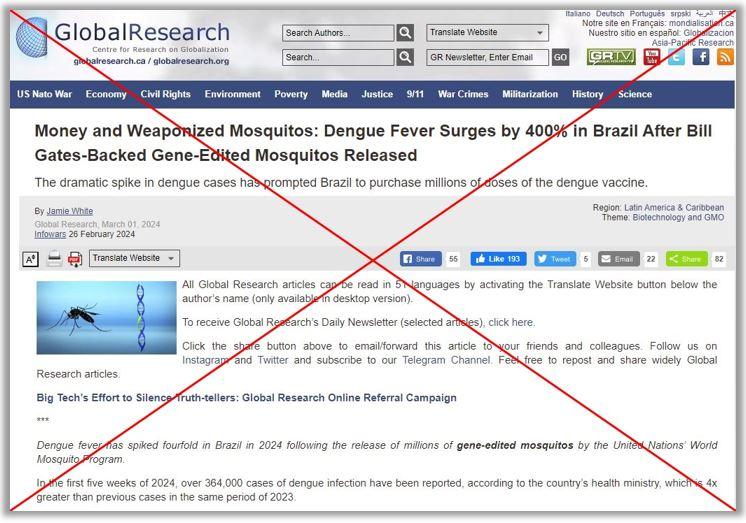
Gates Foundation, biotech company falsely implicated in Brazil dengue surge
- This article is more than one year old.
- Published on March 12, 2024 at 18:19
- 3 min read
- By Natalie WADE, AFP USA
"Money and Weaponized Mosquitos: Dengue Fever Surges by 400% in Brazil After Bill Gates-Backed Gene-Edited Mosquitos Released," says the headline of a March 1, 2024 article on Global Research, a Canadian website that the US Department of State warns is linked to Russia’s disinformation and propaganda ecosystem (archived here).

The claim spread on other websites and Facebook, including posts in French.
Dengue fever in Brazil continues to rise after health authorities registered more than 395,000 likely cases of the mosquito-borne disease in the first five weeks of 2024, four times more than in the same period last year (archived here). The number has since topped one million.
Brazil launched a dengue fever immunization campaign in February, becoming the first country to provide the vaccine through its public health system, and has also used specially bred mosquitoes to help limit the spread.
Oxitec, a biotech company that has received funds from the Gates Foundation, develops and releases genetically modified Aedes aegypti mosquitoes to fight dengue and several other diseases in various parts of the world.
However, a spokesperson at the Gates Foundation told AFP on March 11, 2024: "The foundation does not fund any of Oxitec's work involving Aedes aegypti mosquito release in Brazil."
The foundation's website lists grants awarded to Oxitec. None mention funding dengue interventions (archived here). The grants address malaria and it remains "committed to devoting resources and expertise toward the goal of ending the disease for good," the spokesperson added.
GMO mosquitoes have been widely used to prevent outbreaks. Such initiatives have been a frequent target of misinformation.
GMO mosquitoes
Regarding the claim, Joshua Van Raalte, a spokesman at Oxitec said in a March 7, 2023 email: "Oxitec mosquitoes that have been released in Brazil are male only, meaning they are unable to bite humans, so the spread of any diseases is scientifically impossible."
Oxitec's mosquitoes have a "self-limiting gene," which means that when they mate with the invasive local females, female offspring do not survive into adulthood. Since only female mosquitoes bite, this reduces the number of potential disease spreaders, says the Center for Disease Control and Prevention (CDC) (archived here).
Van Raalte said the claim is not only "false," but "In fact, this technology has been scientifically proven to suppress the disease-carrying female Aedes aegypti mosquitoes (the mosquito that carries dengue) by more than 90 percent."
Albert Ko professor at the Yale School of Public Health and expert in microbial and infectious diseases (archived here), told AFP in a March 7 email that "there is no scientific evidence to support assertions that the use of this vector control intervention or dengue vaccines are the cause of the epidemic."
Transgenic mosquito programs have attracted controversy in the past. In 2020, the WHO said they raise “problems of ethics, security and governance.” Specialists are also concerned about the long-term impact of gene modification on ecosystems, including the food chain.
Oxitec, however, received full national biosafety approval for commercial release from CTNBio, Brazil’s biosafety regulatory authority (archived here). The US Environmental Protection Agency approved the method after conducting a human and environmental health risk assessment of the pilot project (archived here and here). This was followed by the release of mosquitoes in Florida and California (archived here and here).
The CDC also highlights the success of mosquitoes "in parts of Brazil, the Cayman Islands, Panama, and India to control Ae. aegypti mosquitoes," (archived here).
Article confounds facts
"The Oxitec intervention is based on GMO mosquitoes but the article mentions Wolbachia-infected mosquitoes which are not GMO," said Ko. “The article is confounding facts."
Wolbachia is a common type of bacteria found in a variety of insects and has no potential to make humans or animals sick, according to the CDC (archived here).
This technique has been used by the World Mosquito Program to reduce the spread of several diseases. When male mosquitoes with Wolbachia mate with wild female mosquitoes. the eggs they produce do not hatch.
AFP has fact-checked other false and misleading claims about genetically modified mosquitoes here, here and here, including in Spanish here.
Copyright © AFP 2017-2026. Any commercial use of this content requires a subscription. Click here to find out more.
Is there content that you would like AFP to fact-check? Get in touch.
Contact us
